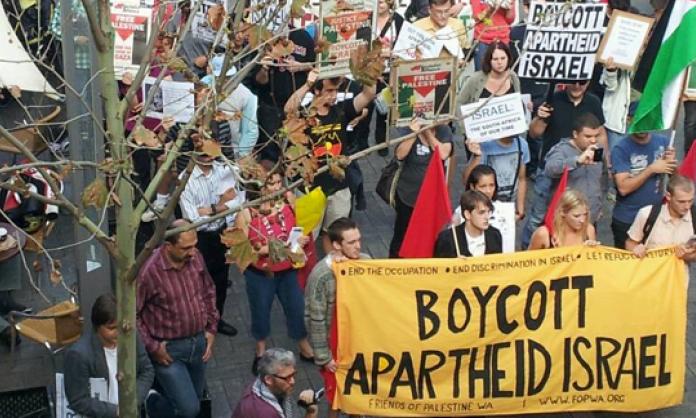The Australia Palestine Advocacy Network (APAN) – a national coalition advocating peace and justice in Palestine – has declared its support for a “policy of boycotts, divestment and sanctions (BDS) of Israeli and international institutions complicit in violations of human rights and international law in Israel and Palestine”.
APAN’s endorsement of BDS comes a decade after 170 Palestinian political parties, trade unions and civil society organisations called for an international BDS campaign aimed at achieving an end to Israel’s brutal occupation.
At APAN’s 2014 AGM, executive member Peter Slezak argued that APAN should endorse BDS. However, anti-BDS conservatives on APAN’s executive prevailed, arguing that support for BDS would likely “close doors” to the offices of Australian parliamentarians who regard BDS as “politically toxic”.
In a media release issued on 26 October following APAN’s latest AGM, spokesperson Michael Shaik explained that three developments had prompted the decision to back BDS: the failure of the peace process, last year’s assault on Gaza and the March re-election of Israeli PM Benjamin Netanyahu.
“It is noteworthy that since 1993”, explained Shaik, “the main outcome of a succession of the US-brokered ‘peace processes’ has been to normalise the process of colonisation and displacement that is destroying the territorial basis of Palestinian statehood and marginalising Palestinian moderates who call for a negotiated end to the conflict”.
Shaik also noted that Netanyahu’s re-election platform, which included “continued settlement expansion, explicit opposition to Palestinian statehood and naked appeals to anti-Arab racism”, was largely shared by all Zionist parties within the Israeli Knesset, including the opposition party, the Zionist Union.
In an article published by New Matilda on 27 October, Sydney University professor Jake Lynch described APAN’s shift from a focus on lobbying politicians to endorsement of BDS as “born of frustration at the lack of meaningful progress on either side of politics in Canberra”. Lynch held up the Greens campaign for an arms embargo against Israel, led by NSW senator Lee Rhiannon, as “the honourable exception”.
In recent years, however, the Greens have tail-ended the major parties’ hostility to BDS.
In April 2012, incoming federal Greens leader senator Christine Milne told Australian Jewish News (AJN) that BDS “is behind us”, a position reaffirmed by Milne’s successor, senator Richard Di Natale, in an interview with AJN on 22 May of this year.
Both Milne and Di Natale praised Israel’s environmental credentials. “Israelis are at the forefront of innovative technologies”, Di Natale told AJN, apparently ignorant of the gross inequality in access to water between Israel settlers and Palestinians. “If only Australia took a leaf out of their book”, he said.
Di Natale also defended Israel’s “right to exist as a Jewish state” on 22 May, although he later retracted this statement after numerous calls from Greens members to the senator’s office, according to New Matilda.
While the Australian political establishment remains firmly committed to close Australian government ties with Israel, the current upsurge of Palestinian protest against the Israeli occupation, and the savage Israeli military response, have no doubt shifted Australian public opinion and consequently the attitude of church leaders, union officials and other members of APAN’s executive.
Whether this will translate into more tangible support for the protest initiatives of activist Palestine solidarity groups remains to be seen.
----------
Nick Everett is a former convener of Friends of Palestine WA.




